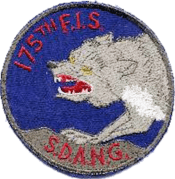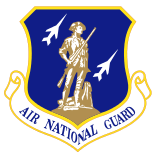175th Fighter Squadron
| 175th Fighter Squadron | |
|---|---|
|
175th Fighter Squadron - 4 ship F-16s over Mount Rushmore | |
| Active | 1943-Present |
| Country |
|
| Allegiance |
|
| Branch |
|
| Type | Squadron |
| Role | Air Defense, Attack |
| Part of | South Dakota Air National Guard |
| Garrison/HQ | Joe Foss Field Air National Guard Station, Sioux Falls, South Dakota |
| Nickname | "Fightin' Lobos" |
| Tail Code | Dark Grey tail stripe "Lobos";The front of a timber wolf is running across the tail. |
| Engagements | World War II |
| Insignia | |
| 175th Fighter Squadron emblem |
 |
The 175th Fighter Squadron (175 FS) is a unit of the South Dakota Air National Guard 114th Fighter Wing located at Joe Foss Field Air National Guard Station, Sioux Falls, South Dakota. The 175th is equipped with the F-16C/D Fighting Falcon.
History
World War II
Constituted as 387th Fighter Squadron on 27 April 1943. Activated on 15 May 1943. Trained with P-47's. Moved to RAF Gosfield, England in December 1943. Assigned to IX Fighter Command. Their first mission. flown on 22 February, was a bomber support sweep of short duration over enemy-held territory. Early missions were flown in support of Eighth Air Force B-17 and B-24 bomber operations Later, the 365th flew dive-bombing missions to attack such targets as bridges, aerodromes, rail facilities, gun positions, and V-weapon sites prior to the invasion of the Continent.
The 387th began its move to the Continent on 21 June, the first squadron taking up residence at Azeville, France (A-71) on 26 June, the last moving out of Beaulieu on 28 June and the rear party on 2 July providing tactical air support in support of U.S. First Army. On the continent, the squadron moved rapidly from one airfield to another, eventually winding up near Fritzlar, Germany (Y-86) on VE-Day.
After the end of hostilities, the 387th Fighter Squadron took part in the disarmament program until June, then returned to the United States in September 1945, being inactivated at Camp Myles Standish, near Taunton, Massachusetts on 22 September 1945.
South Dakota Air National Guard
The wartime 387th Fighter Squadron was re-designated and re-designated as the 175th Fighter Squadron, and was allotted to the South Dakota Air National Guard, on 24 May 1946. It was organized at Sioux Falls Municipal Airport and was extended federal recognition on 20 September 1946 by the National Guard Bureau. The 175th Fighter Squadron was bestowed the history, honors, and colors of the 387th Fighter Squadron. The squadron was equipped with F-51D Mustangs and was assigned administratively to the Minnesota ANG 133d Fighter Group at Minneapolis, however the squadron was under the jurisdiction of the South Dakota Air National Guard and Military Department. The mission of the 175th Fighter Squadron was the air defense of South Dakota.
Air Defense

On 2 March 1951 the 175th was federalized and brought to active-duty due to the Korean War. It remained assigned to the 133d Fighter-Interceptor Group and was moved to Rapid City Air Force Base, South Dakota. Its mission was the air defense of the SAC 28th Bombardment Wing B-36 Peacemaker Bombers stationed there. It was reassigned to the Air Defense Command 31st Air Division on 6 February 1952, and returned to the control of the State of South Dakota on 1 December 1952
Returning to Sioux Falls, the unit was re-formed by 1 January 1953 and again was returned to the control of Air Defense Command (ADC). In September 1953 the runway alert program began with two F-51D Mustangs on alert 14 hours a day. On 1 November 1954, the 175th began the transition from the piston-engine, propeller driven F-51D to its first jet aircraft, the F-94A Starfire interceptor.
On 16 April 1956, the 175th was authorized to expand to a group level, and the 114th Fighter-Interceptor Group was established by the National Guard Bureau. The 175th FIS becoming the group's flying squadron. Other squadrons assigned into the group were the 114th Headquarters, 114th Material Squadron (Maintenance), 114th Combat Support Squadron, and the 114th USAF Dispensary.
During the 1950s and 1960s, the unit was upgraded by ADC as newer interceptors became available to the Air National Guard. F-89 Scorpions were received in 1958 and F-102A Delta Dagger supersonic aircraft in 1960.
Tactical Air Command

In 1970, Aerospace Defense Command was reducing the CONUS interceptor force, as the chances of a bomber attack by the Soviet Union seemed remote in the age of Intercontinental ballistic missiles (ICBM). The Group was transferred to Tactical Air Command (TAC) on 23 May 1970 and was re-designated as the 114th Tactical Fighter Group. The 175th Tactical Fighter Squadron began receiving F-100 Super Sabre tactical fighters that were being withdrawn from service in the Vietnam War.
News was received in March 1976 of the replacement of the unit's F-100D aircraft with A-7D Corsair II jets. The last Super Sabres left Joe Foss Field in June 1977. In 1979, the unit began a 12-year era of participation in Operation Coronet Cove at Howard AFB providing for defense of the Panama Canal. Both aircrew and support personnel were extended there in the summer of 1979 during the Nicaraguan crisis. The unit was awarded the Armed Forces Expeditionary Streamer for combat duty as a part of Operation Just Cause during 1989-1990.
Tactical Air Command began retiring the A-7D in the late 1980s, with units being transitioned from the A-7D/K to the F-16C/D block 30. The first F-16 to arrive with the 175th Fighter Squadron was on 14 August 1991. In June 1993 the squadron deployed eight aircraft to Brustem AB, Belgium as Coronet DART for the European exercise Central Enterprise 1993. In December 1993 the squadron deployed again, this time for their first combat deployment with the F-16. Stationed at Incirlik AB, Turkey the squadron flew missions over Northern Iraq to guard the no-fly zone to protect Kurdish refugees.
Combat patrol missions were flown over the northern "No Fly" zone of Iraq from December 1993 to January 1994. The 114th Fighter Group was re-designated as the 114th Fighter Wing in October 1995. The unit subsequently supported Operation Northern Watch, based out of Turkey in 1995 and 2002, and Operation Southern Watch based out of Kuwait in 1998 and Saudi Arabia in 2001.
Global War on Terrorism

A new chapter was opened in the history of the Air National Guard with the terrorist attacks on America on September 11, 2001. In addition to the unit's ongoing tasking as part of the Air Expeditionary Force (AEF), unit members were also activated to support Operation Noble Eagle within the United States and Operation Enduring Freedom (OIF). OIF deployments during the 2000s included three to Balad AB, Iraq (October–December 2006; June–September 2008; January–April 2010.
On 25 October 2005 an F-16 of the unit was attempting to take fuel from a KC-10 Extender. The jet suffered more than $930,000 of damage. The boom operator's accidental oscillation caused damages to both aircraft which were able to land safely. An unusual accident for a squadron which has enjoyed a tremendous safety record. During 2007 the squadron was the recipient of the National Guard Bureau’s Winston P. Wilson Trophy. The trophy goes to the most outstanding Air National Guard unit and is awarded annually. Just three years later the squadron would win the trophy again in 2010.
The 2005 Base Realignment and Closure committee recommended that the 175th Fighter Squadron retire its older block 30 F-16s and upgrade to the block 40. The first F-16C block 30 to depart was 'Cujo' aircraft (#85-1434) which occurred on 7 May 2010 with destination AMARG. Over the next five months they received block 40 vipers from all three squadrons at Hill AFB, Utah which were largely as a result of the disestablishment of the 34th Fighter Squadron.
Lineage

- Constituted 387th Fighter Squadron on 27 April 1943
- Activated on 15 May 1943.
- Inactivated on 22 September 1945
- Re-designated 175th Fighter Squadron, and allotted to South Dakota ANG, on 24 May 1946.
- Received federal recognition on 20 September 1946
- Re-designated: 175th Fighter-Interceptor Squadron on 2 March 1951
- Federalized and placed on active duty, 1 April 1951
- Released from active duty and returned to South Dakota state control, 15 November 1952
- Re-designated: 175th Tactical Fighter Squadron on 23 May 1970
- Re-designated: 175th Fighter Squadron on 15 March 1992
Assignments
- 365th Fighter Group, 15 May 1943 – 22 September 1945
- 71st Fighter Wing, 20 September 1946
- 133d Fighter Group, 28 August 1947
- 133d Fighter-Interceptor Group, 2 March 1951
- 31st Air Division, Air Defense Command, 6 February 1952
- 133d Fighter-Interceptor Group, 1 December 1952
- 114th Fighter-Interceptor Group, 16 April 1956
- 114th Tactical Fighter Group, 23 May 1970
- 114th Fighter Group, 15 March 1992
- 114th Operations Group, 11 October 1995 – present
Stations
|
|
Aircraft
|
|
References
![]() This article incorporates public domain material from websites or documents of the Air Force Historical Research Agency.
This article incorporates public domain material from websites or documents of the Air Force Historical Research Agency.
- A Handbook of Aerospace Defense Organization 1946 - 1980, by Lloyd H. Cornett and Mildred W. Johnson, Office of History, Aerospace Defense Center, Peterson Air Force Base, Colorado
- Maurer, Maurer. Combat Squadrons of the Air Force: World War II. Maxwell Air Force Base, Alabama: Office of Air Force History, 1982.
- Rogers, B. (2006). United States Air Force Unit Designations Since 1978. ISBN 1-85780-197-0
- 175th Fighter Squadron Lineage and History
- 114th Fighter Wing history webpage
External links
| ||||||||||||||||||||||||||||||||||||||||||||||||||||||||||||||||||||||||||||||||||||||||||||||||||||||||||||||||||||||||||||||||||||||||||||||||||||||||||||||||||||||||||||||||||||||||||||||||||||||||||||||||||||||||||||||||||||||||||
| |||||||||||||||||||||||||||||||||||||||||||||||


